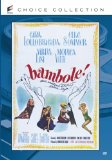| Reviews & Columns |
|
Reviews DVD TV on DVD Blu-ray 4K UHD International DVDs In Theaters Reviews by Studio Video Games Features Collector Series DVDs Easter Egg Database Interviews DVD Talk Radio Feature Articles Columns Anime Talk DVD Savant Horror DVDs The M.O.D. Squad Art House HD Talk Silent DVD
|
DVD Talk Forum |
|
|
| Resources |
|
DVD Price Search Customer Service #'s RCE Info Links |
|
Columns
|
|
|
Bambole!
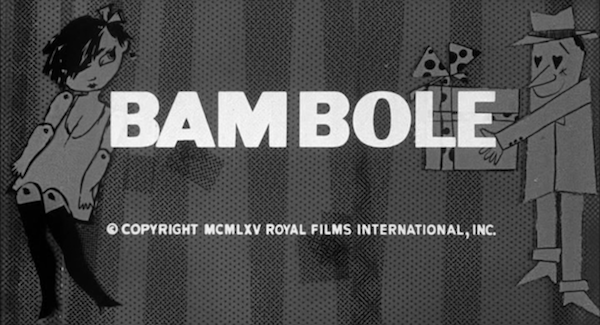
Four gorgeous European actresses -- Gina Lollobrigida, Monica Vitti, Elke Sommer, and Virna Lisi -- are the glue that holds together the 1965 Italian sex-comedy anthology film Bambole (aka The Dolls or Four Kinds of Love), an entertaining hodgepodge of vignettes with only the vaguest of thematic similarities. Some might argue that Bambole's PG-rated approach to sex is a little quaint and dated, but the fact that the film frequently makes no attempt to cloak its characters' sexual desires under the guise of romantic love makes it a refreshingly frank bit of prurience.
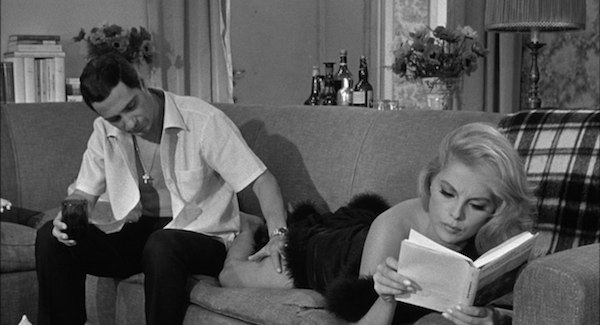
The first vignette, titled "The Telephone Call" and directed by Dino Risi (who later directed the original Italian version of Scent of a Woman), is the simplest and possibly the best of Bambole's four short stories. It's a hot Sunday afternoon and a young husband (Nino Manfredi) is bored and horny. His wife (Virna Lisi) is sprawled on the sofa in a negligee, but she's not in the mood. First, she promises to pay attention to her hubby when she's done reading her book. Then, when she finishes with that, her mother calls on the phone and the wife refuses to hang up on her. Manfredi carries the segment beautifully, in an almost entirely wordless performance, as he fluctuates between trying to busy himself, trying to get his wife somehow in the mood, and just straight-up trying maneuver her body into bed -- all while she blabs to Mama. The pay-off of the sequence is a little bit troubling in this more enlightened era of sexual politics, but admittedly it still gave me a giggle.

A Shot in The Dark's Elke Sommer plays Ulla, a tourist visiting Italy in the second segment, "A Treatise on Eugenics," directed by Luigi Comencini. Ulla is a self-possessed modern woman who hires a taxi for her stay, but then makes the driver scoot over so she can drive herself. She tells her driver Valerio (Piero Focaccia) that she is a scientist, interested in Eugenics. She corrals Valerio into helping her snare a bunch of beefcakes for her "research." Unfortunately, most of the beefcakes are dumb as a box of rocks and fail to pass her simple intelligence test -- but Valerio solves it handily. When Ulla reveals she is actually looking for the best specimen to father a child (big non-shocker!), Valerio volunteers himself. But Ulla turns him down, because he's not the right physical type. When the seemingly perfect specimen (Maurizio Arena) comes along, Valerio jealously refuses to abet her "experiments" anymore.
"A Treatise on Eugenics" is probably the weakest of the four episodes, but not by too much. The actors do a good job of enlivening the clunky sitcom plot, bringing a few smiles if not too many laughs. Honestly, the whole thing feels like an excuse for the few brief scenes where the audience gets to see Elke Sommer in skimpy clothing -- and, for that, the audience is no doubt grateful. The ending on this one is even more of a reactionary groaner than the last segment, but it's all in the spirit of the piece.
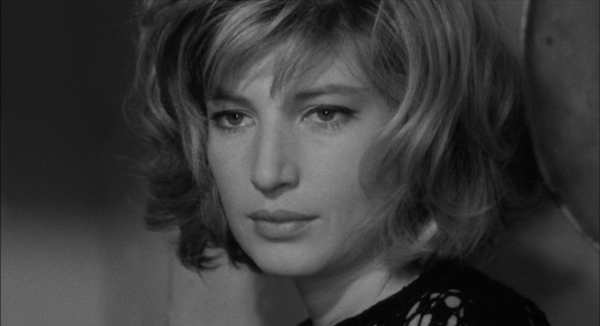
Giovanna (Monica Vitti, L'Avventura and Modesty Blaise) wants to off her crotchety old husband, but she doesn't have the guts to do it, in the (relatively) darkest episode of the four. Directed by Franco Rossi (who later did the 1985 mini-series version of Quo Vadis?), the third segment is titled "The Soup," which refers to the dinner of pasta-and beans soup that Giovanna is stuck making and eating every night. If this was an Alfred Hitchcock Presents episode, it might have also referred to an eventual method of getting rid of her husband but, in this story, Giovanna never comes up with the idea for a simple poisoning. Instead, she persuades a series of men to do the dirty work, telling them to make it look like an accident. Attempt after attempt fails, as Giovanna runs out of money to pay potential hitmen, climaxing in a very amusing blunder by a motorcycle-riding Brando-wannabe who has fallen in lust with Giovanna. It's a pleasure to see Vitti hamming it up in scenes where she pretends to be worried about her husband's safety in front of her neighbors, only to have the old man walk in unscathed and spoil her fun.
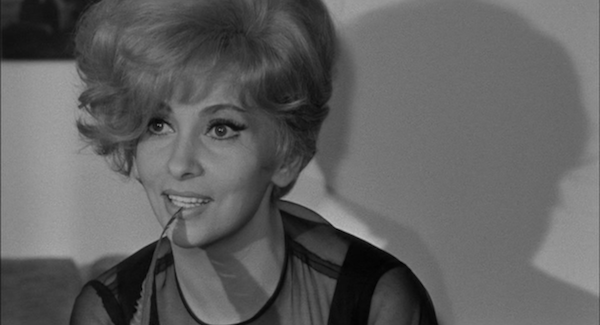
The final segment, directed by Mauro Bolognini, is called "Monsignor Cupid" and is a riff on an episode from Boccaccio's Decameron. Gina Lollobrigida plays Beatrice, the wife of the owner of a hotel that has been taken over by the Ecumenical Council. The hotel has had to take down paintings and put up crosses for the sake of the monks, priests, and other religious men who will be staying at the hotel, and Beatrice is told patronizingly by her hubby to be on her best behavior. When Monsignor Arendi (Akim Tamiroff, For Whom The Bell Tolls and Touch of Evil) arrives with his handsome young nephew/secretary Vincenzo (Jean Sorel, Belle De Jour), Beatrice is smitten and contrives to have the boy put in the room next to hers (she sleeps alone). Unfortunately, Vincenzo is so straitlaced he doesn't have the good sense to peer through the keyhole of the door connecting their rooms, even when Beatrice does a striptease for him. Frustrated, she decides to start complaining to the Monsignor about Vincenzo, making up stories about how he has been taking advantage of her -- hoping, of course, that he will understand that he can easily take advantage of her. Eventually, the kid gets it -- and so does Beatrice, if you get my meaning. Har har har.
THE DVD
Bambole comes on a manufactured-on-demand DVD-R from the Sony Pictures Choice Collection. While the film has chapter stops that actually relate to moments in the film, as opposed to just every 10 minutes as it is with some MOD releases, there are no menus or special features. That is, unless you consider the fact that the movie automatically starts playing again once it reaches the end a special feature.
The Video:
Considering the age and relative obscurity of this movie, this release looks quite good. I tried to do some research on previous DVD releases, and they all seem to have been sourced from duped or overall poor elements. That is not the case with this version. The detail in the black-and-white 1.77:1 anamorphic image is quite good, and it has a nice contrast range. There is shimmering and sporadic video noise, but it is not terribly distracting. In the hit-and-miss world of MOD releases, this is definitely on the higher end.
The Audio:
There is only dubbed English mono audio. No other language tracks and no subtitles. The dubbing actually fits the picture pretty well, in my opinion, and usually I am a bit of a subtitles-purist when it comes to foreign films (of course, considering the way they made films in Italy then, the Italian-language version was probably dubbed too). The track itself seems to be free from defect is perfectly intelligible.
Final Thoughts:
While not a lost world masterpiece, Bambole is an entertaining and fairly titillating time capsule that will satisfy fans of the leading ladies.
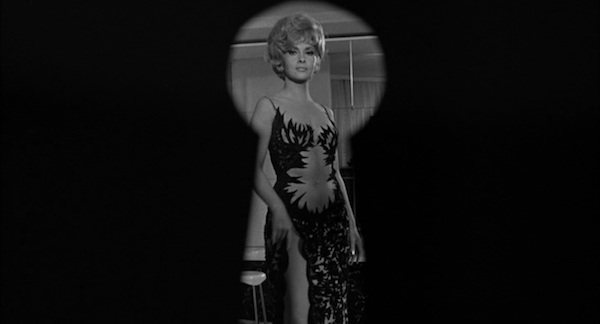
Justin Remer is a frequent wearer of beards. His new album of experimental ambient music, Joyce, is available on Bandcamp, Spotify, Apple, and wherever else fine music is enjoyed. He directed a folk-rock documentary called Making Lovers & Dollars, which is now streaming. He also can found be found online reading short stories and rambling about pop music.
|
| Popular Reviews |
| Sponsored Links |
|
|
| Sponsored Links |
|
|
| Release List | Reviews | Shop | Newsletter | Forum | DVD Giveaways | Blu-Ray | Advertise |
|
Copyright 2024 DVDTalk.com All Rights Reserved. Legal Info, Privacy Policy, Terms of Use,
Manage Preferences,
Your Privacy Choices | |||||||









